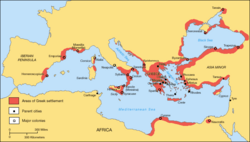Greek diaspora
The Greek Diaspora ( Greek διασπορά Diaspora or omogénia ) denotes the communities outside of Greece living Greeks and refers both to those who since ancient times exist (eg. As in the Caucasus) and the emigration in modern times (z. B. USA) . Areas with predominantly Greek populations are not counted even if they are outside of Greece, e.g. B. in Cyprus or the Magna Graecia in southern Italy.
Long periods of life abroad are quite common among Greeks, and even the rule among academics and personalities.
The largest diaspora community is in the USA, where around 1.3 million diaspora Greeks live, mostly longer than in the third or fourth generation (corresponding residential areas are called Greektown ). The predominant part is of the Christian Orthodox faith (since 1922 belonging to the Ecumenical Patriarchate of Constantinople ), there are also numerous Diaspora Greeks of Jewish faith due to the Second World War, so that in some cases there is an overlap with the Jewish Diaspora . Conversely, there are members of Greek Orthodox communities who come from the Middle East but are not Greek-speaking, particularly from Syria and Lebanon.
history
Antiquity
Due to the country's coastline and island geography, the Greeks have engaged in exchanges with other peoples and colonization since ancient times. It was less about the establishment of a large area than about the economic and cultural exchange. Already around 800 BC There were Greek city-states on many coasts of the Mediterranean and the Black Sea. a. Marseille , Nice , Odessa . Another Greek colonization began at the time of Alexander the Great and encompassed Egypt, the Middle East and extended as far as India.
Modern times

The fall of Constantinople in 1453 and the Ottoman Empire led to constant emigration from Greece, primarily to Western Europe and Russia later to other parts of the world. During the Renaissance, many Greeks found employment as translators and teachers of ancient writings. The centers of emigration were the Republic of Venice and the Ionian Islands.
Emigration from Greece to North America, Australia and Latin America (especially Argentina) began in the 19th century. The southern routes of Greek shipping companies transporting European emigrants began in Piraeus . In the 20th century there were always politically motivated emigrations, so after the Greek civil war Greek communists moved to countries of the Eastern bloc, but mostly returned to Greece for economic reasons.
Diaspora Greeks were also repeatedly exposed to hostility, on the one hand through state repression, for example 1956-57 under Gamal Abdel Nasser in Egypt, on the other hand through individual groups, such as the war veterans at the anti-Greek riots in Toronto in 1918 , or persecution by the Ku- Klux-Klan For this reason, the AHEPA was founded in the USA in 1920 , an aid organization which set itself the goal of intensifying the exchange of Greeks and non-Greeks.
In the US, people of Greek origin have a higher socio-economic status than other US citizens.
The largest community in the Greek diaspora today lives in Melbourne . The 300,000 or so people of Greek origin who live there have resulted in Melbourne being described as "the largest Greek city outside of Greece"; it is actually the third largest Greek community in the world after Athens and Thessaloniki . Greek-influenced residential areas are usually referred to as Greektown .
Of the around 380,000 Greeks in Germany , the majority are descendants of guest workers, including regional merchants from the fur or tobacco industries.
Individual evidence
- ↑ https://www.thenationalherald.com/1316/a-look-at-americans-of-greek-ancestry/
- ↑ https://www.thenationalherald.com/1316/a-look-at-americans-of-greek-ancestry/
- ↑ “Little Athens in Down Under” , article in Deutschlandfunk Kultur , Andreas Stummer, August 26, 2015, accessed on August 22, 2019
- ^ "From the happiness of the Hellenic diaspora" , article in the Neue Zürcher Zeitung , Heidi Gmür, June 15, 2012, accessed on August 22, 2019
- ↑ “Greeks flee from the crisis” , article in Handelsblatt , Urs Wolderlin, July 5, 2015, accessed on August 22, 2019
literature
- Harald Heppner, Olga Katsiardē-Hering: The Greeks and Europe: Outside and Inside Views in the Change of Time . Böhlau, 1998


